现在完成时导学案
仁爱版英语九年级上册Unit1 Topic1 SectionA(现在完成时Ⅰ )导学案
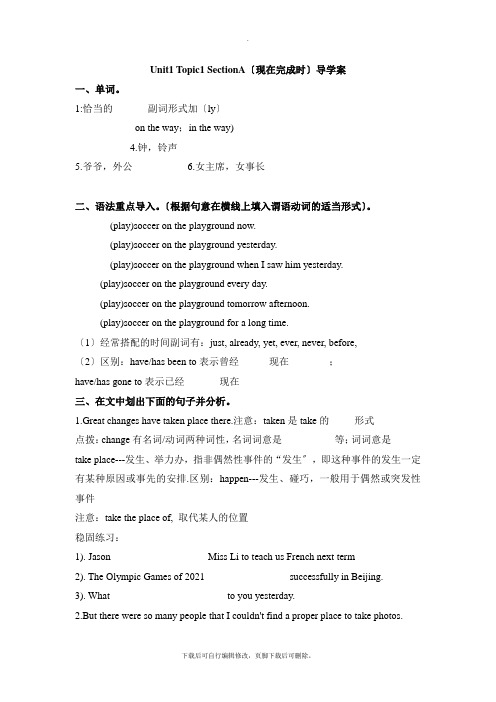
Unit1 Topic1 SectionA〔现在完成时〕导学案一、单词。
1:恰当的_______副词形式加〔ly〕____________________on the way;in the way)___________4.钟,铃声____________5.爷爷,外公___________6.女主席,女事长_________________________二、语法重点导入。
〔根据句意在横线上填入谓语动词的适当形式〕。
_______(play)soccer on the playground now._______(play)soccer on the playground yesterday._______(play)soccer on the playground when I saw him yesterday._____(play)soccer on the playground every day._____(play)soccer on the playground tomorrow afternoon._____(play)soccer on the playground for a long time.〔1〕经常搭配的时间副词有:just, already, yet, ever, never, before,〔2〕区别:have/has been to表示曾经______现在________;have/has gone to表示已经_______现在______三、在文中划出下面的句子并分析。
1.Great changes have taken place there.注意:taken是take的_____形式点拨:change有名词/动词两种词性,名词词意是_____ _____等;词词意是______ take place---发生、举力办,指非偶然性事件的“发生〞,即这种事件的发生一定有某种原因或事先的安排.区别:happen---发生、碰巧,一般用于偶然或突发性事件注意:take the place of, 取代某人的位置稳固练习:1). Jason ___________________Miss Li to teach us French next term2). The Olympic Games of 2021_________________successfully in Beijing.3). What _______________________to you yesterday.2.But there were so many people that I couldn't find a proper place to take photos.思考:so,that,意思是_____________, 引导________状语从句,造句:她是如此的小以至于她不会自己穿衣服。
现在完成时教案

现在完成时导学案一、定义:现在完成时表示到现在为止已经完成或仍在持续的动作、状态;强调对现在的影响或联系。
二、结构:have/has+p.p.(动词过去分词)肯定句式现在完成时的肯定句式是“have(has)+过去分词”。
如:①We have just finished our homework.② She has gone home.注意:1)该句式中的have或has是助动词,has用于第三人称单数,其它人称一律用have。
2)把该句式译成汉语时,往往用“已经”、“刚刚”、“过”或“了”等。
3)该句式中have(has)和过去分词之间可用just插入。
否定句式:现在完成时的否定句式是“haven't(hasn't)+过去分词”。
如:①We haven’t studied Unit 2 yet.②The train hasn't stopped yet.疑问句式现在完成时的一般疑问句式是把助动词have或has提到主语之前。
Have you read this story book yet?特殊疑问句:What have you done with my bike?注意:1)现在完成时的一般疑问句往往在句末加yet。
2)把现在完成时的一般疑问句译成汉语时,往往译成“……过吗?”、“已经……了吗?”等。
3)其肯定回答用“Yes,...have(has).”,否定回答用“No,.haven't(hasn't).”,有时用“No,not yet.”或“No,never.”。
练习:A)选用have, has填空:1.I _______ told him the news.2.She ________ come back from school.3.You ________ won the game.B)按要求改写下列各句:4. They have bought a computer. (改成否定句)_________________________________________5. My father has finished his work.(改为否定句)My father ______ ______his work.6.I’ve ever been to Beijing.(改为一般疑问句)_______you_____ ______to Beijing?7. Jim finished his homework.(改为现在完成时)Jim______ ______ his homework.8.He has been to Guangzhou twice.(就划线部分提问)______ ______ ______has he been to Guangzhou?9.– I have watched the game.--When ____ you ____ it?A have watchedB do watchC did watchD will watch10 ---_____ to the United Stated ?---- No, never, but I went to Canada a few years ago.A. Did you goB. Do you goC. Have you beenD. Have you gone三、用法1)表示过去发生的某一动作对现在造成的影响或结果。
现在完成时导学案
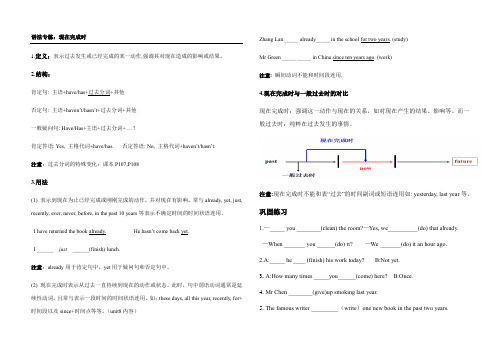
语法专练:现在完成时1.定义:表示过去发生或已经完成的某一动作,强调其对现在造成的影响或结果。
2.结构:肯定句: 主语+have/has+过去分词+其他否定句: 主语+haven’t/hasn’t+过去分词+其他一般疑问句: Have/Has+主语+过去分词+ …?肯定答语: Yes, 主格代词+have/has. 否定答语: No, 主格代词+haven’t/hasn’t.注意:过去分词的特殊变化:课本P107,P1083.用法(1) 表示到现在为止已经完成或刚刚完成的动作,并对现在有影响。
常与already, yet, just, recently, ever, never, before, in the past 10 years等表示不确定时间的时间状语连用。
I have returned the book already. He hasn’t come back yet.I ______ just ______(finish) lunch.注意:already用于肯定句中,yet用于疑问句和否定句中。
(2) 现在完成时表示从过去一直持续到现在的动作或状态。
此时,句中谓语动词通常是延续性动词,且常与表示一段时间的时间状语连用。
如:these days, all this year, recently, for+时间段以及since+时间点等等。
(unit8内容)Zhang Lan _____ already_____ in the school for two years. (study)Mr Green _____ _____ in China since ten years ago. (work)注意:瞬间动词不能和时间段连用.4.现在完成时与一般过去时的对比现在完成时:强调这一动作与现在的关系,如对现在产生的结果、影响等。
而一般过去时:纯粹在过去发生的事情。
注意:现在完成时不能和表“过去”的时间副词或短语连用如: yesterday, last year等。
现在完成时 导学案
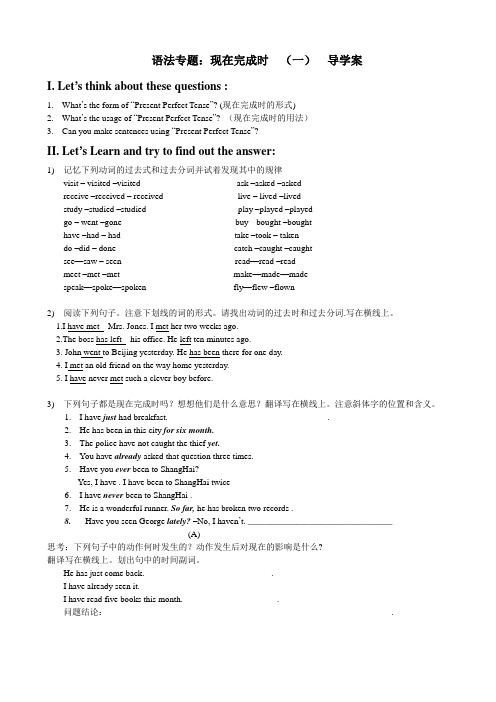
语法专题:现在完成时(一)导学案I. Let’s think about these questions :1.What’s the form of “Present Perfect Tense”? (现在完成时的形式)2.What’s the usage of “Present Perfect Tense”? (现在完成时的用法)3.Can you make sentences using “Present Perfect Tense”?II. Let’s Learn and try to find out the answer:1)记忆下列动词的过去式和过去分词并试着发现其中的规律visit – visited –visited ask –asked –askedreceive –received – received live – lived –livedstudy –studied –studied play –played –playedgo – went –gone buy-- bought –boughthave –had – had take –took – takendo –did – done catch –caught –caughtsee—saw – seen read—read –readmeet –met –met make—made—madespeak—spoke—spoken fly—flew –flown2)阅读下列句子。
注意下划线的词的形式。
请找出动词的过去时和过去分词.写在横线上。
1.I have met Mrs. Jones. I met her two weeks ago. __________________________2.The boss has left his office. He left ten minutes ago. _______________________3. John went to Beijing yesterday. He has been there for one day. _______________________4. I met an old friend on the way home yesterday. ___________________________5. I have never met such a clever boy before._________________________________3)下列句子都是现在完成时吗?想想他们是什么意思?翻译写在横线上。
现在完成时导学案
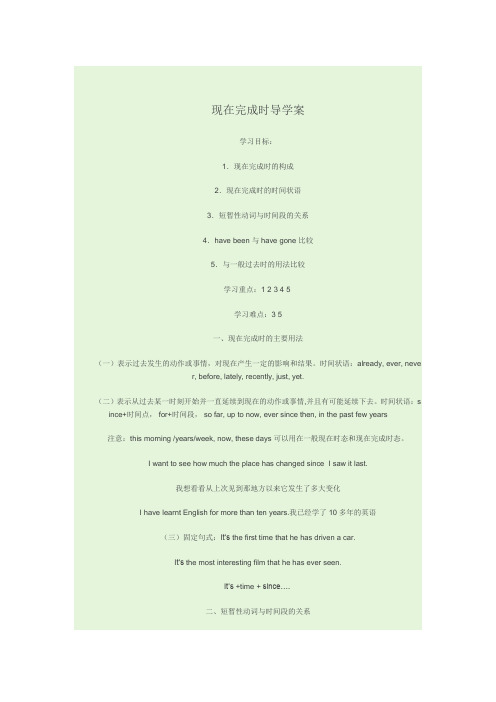
现在完成时导学案学习目标:1.现在完成时的构成2.现在完成时的时间状语3.短暂性动词与时间段的关系4.have been 与have gone 比较5.与一般过去时的用法比较学习重点:1 2 3 4 5学习难点:3 5一、现在完成时的主要用法(一)表示过去发生的动作或事情,对现在产生一定的影响和结果。
时间状语:already, ever, never, before, lately, recently, just, yet.(二)表示从过去某一时刻开始并一直延续到现在的动作或事情,并且有可能延续下去。
时间状语:s ince+时间点, for+时间段, so far, up to now, ever since then, in the past few years注意:this morning /years/week, now, these days可以用在一般现在时态和现在完成时态。
I want to see how much the place has changed since I saw it last.我想看看从上次见到那地方以来它发生了多大变化I have learnt English for more than ten years.我已经学了10多年的英语(三)固定句式:It’s the first time that he has driven a car.It’s the most interesting film that he has ever seen.It’s +time + since….二、短暂性动词与时间段的关系(一)短暂性动词在肯定句、疑问句中不能与时间段连用,这些动词是:become, begin, buy, borro w, arrive, come, die, fall, finish, get to know, go, join, leave, marry 等(二)相应的延续性动词代替短暂性动词:become →be,begin→have , borrow → keep, bu y → have, come (go, arrive, get) →be here/there/in…,die→be dead, fall asleep (ill) →be asleep (ill), fi nish→ be over, get to know→know,join→be in …(be a member of …), leave→be away(from…), marry→be married等他入党五年了。
(完整版)现在完成时导学案.doc

高青二中导学案班级:组别:姓名:法:在完成1.定义:表示去生或已完成的某一作,其在造成的影响或果。
2.结构:肯定句 : 主 +have/has+去分 +其他否定句 : 主 +haven’t/hasn ’ 去t+分 +其他一般疑句 : Have/Has+主 +去分 + ⋯?肯定答 : Yes, 主格代 +have/has.否定答: No,主格代+haven’t/hasn’t.注意:去分的特殊化:本P107,P1083.用法(1) 表示到在止已完成或完成的作,并在有影响。
常与already, yet, just, recently, ever, never, before, in the past 10 years等表示不确定的状用。
I have returned the book already.He hasn ’ t come backyet.I ______ just ______(finish) lunch.注意: already 用于肯定句中, yet 用于疑句和否定句中。
(2)在完成表示从去一直持到在的作或状。
此,句中通常是延性,且常与表示一段的状用。
如:these days, all this year, recently, for+ 段以及since+点等等。
( unit8 内容)Zhang Lan _____ already_____ in the school for two years. (study)Mr Green _____ _____ in China since ten years ago. (work)注意 : 瞬不能和段用.4.现在完成时与一般过去时的对比现在完成时:强调这一动作与现在的关系,如对现在产生的结果、影响等。
而一高青二中导学案班级:组别:姓名:般过去时:纯粹在过去发生的事情。
注意 :现在完成时不能和表“过去”的时间副词或短语连用如: yesterday, last year等。
现在完成时导学案
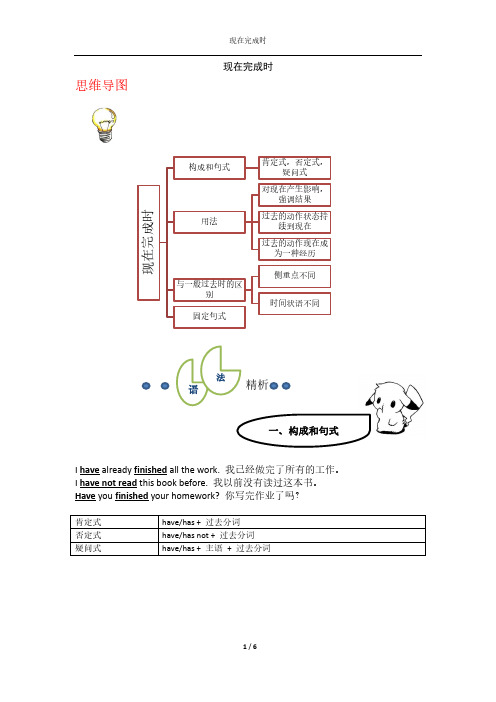
现在完成时思维导图I have already finished all the work. 我已经做完了所有的工作。
I have not read this book before. 我以前没有读过这本书。
Have you finished your homework? 你写完作业了吗?语 法一、构成和句式二、用法一般过去时 现在完成时例句:例1:I have lost my pen. 我把钢笔丢了。
(意即还没找到,现在我没有笔用。
)She lost her pen yesterday. 她昨天把笔丢了。
(笔是昨天丢的,现在找到与否没有说明。
)例2:I have been to the Agricultural Exhibition. 我看过这个农业展览会。
(强调知道它的内容)I went to the Agricultural Exhibition last week. 我上周参观了这个农业展览会。
(只说明我上周参观过展览会这件事。
)例3:Who has opened the door?谁把门开了?(现在门还开着) Who opened the door? 谁开的门?(指过去,与现在无关。
现在门是关着还是开着没有说明) 例3:Where have you been? 你去哪了?(询问经过情况) Where did you go? 你去哪了?(只问地点)辨析It is/has been six years since I came here. 我来这已经六年了。
This is the first time that I have watched a play. 这是我第一次看戏剧。
This is the best film that I have ever seen. 这是我看过的最好的电影。
例:✧ I ’ve lived in this town since 1990. 自从1990年以来我一直居住在这个城市。
现在完成时复习导学案
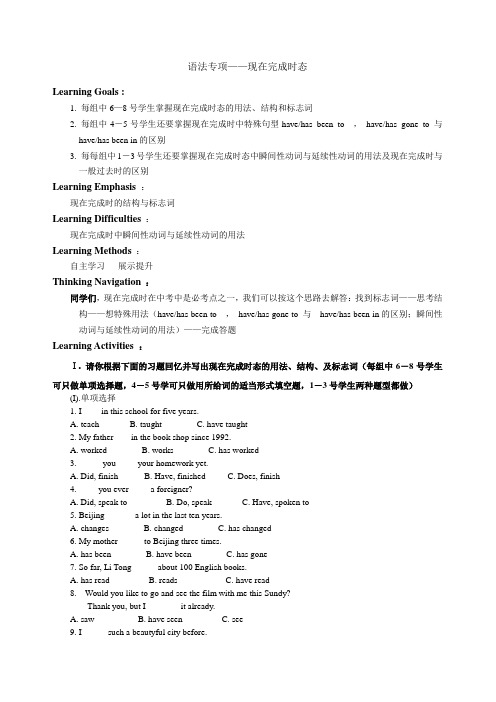
语法专项——现在完成时态Learning Goals :1. 每组中6—8号学生掌握现在完成时态的用法、结构和标志词2. 每组中4-5号学生还要掌握现在完成时中特殊句型have/has been to ,have/has gone to 与have/has been in的区别3. 每每组中1-3号学生还要掌握现在完成时态中瞬间性动词与延续性动词的用法及现在完成时与一般过去时的区别Learning Emphasis :现在完成时的结构与标志词Learning Difficulties:现在完成时中瞬间性动词与延续性动词的用法Learning Methods:自主学习展示提升Thinking Navigation:同学们,现在完成时在中考中是必考点之一,我们可以按这个思路去解答:找到标志词——思考结构——想特殊用法(have/has been to ,have/has gone to 与have/has been in的区别;瞬间性动词与延续性动词的用法)——完成答题Learning Activities :Ⅰ. 请你根据下面的习题回忆并写出现在完成时态的用法、结构、及标志词(每组中6-8号学生可只做单项选择题,4-5号学可只做用所给词的适当形式填空题,1-3号学生两种题型都做)(I).单项选择1. I ____in this school for five years.A. teachB. taughtC. have taught2. My father ___ in the book shop since 1992.A. workedB. worksC. has worked3. _____ you ____ your homework yet.A. Did, finishB. Have, finishedC. Does, finish4. ____ you ever ____ a foreigner?A. Did, speak toB. Do, speakC. Have, spoken to5. Beijing ______ a lot in the last ten years.A. changesB. changedC. has changed6. My mother _____ to Beijing three times.A. has beenB. have beenC. has gone7. So far, Li Tong _____ about 100 English books.A. has readB. readsC. have read8.---Would you like to go and see the film with me this Sundy?---Thank you, but I _______ it already.A. sawB. have seenC. see9. I _____ such a beautyful city before.A. don’t visitB. didn’t visitC. haven’t visit10. Lucy _____ just ______ all the new words.A. have, copiedB. does, copyC. has, copied(II)用所给词的适当形式填空:1.Have you______(see) my pen? I can’t ________(find) it.2. Mary, I’ve______(lose) my cap. Have you ______ (see) it anywhere?3. We've just _______(clean)the classroom4. They_______ (meet)that old man twice.5. You _______(write)500 words so far.6. We _______(live)here for three years.7. Jim _______(study) in this school since 2009.8. —______they______(find)the missing child yet ? —No, they______.9. She ______ (wash)her clothes already.10. —______you ______(have)your lunch?—Not yet.现在完成时态的用法:现在完成时态的结构:肯定形式:否定形式:疑问形式及答语:现在完成时态的标志词:●举一反三,巩固应用,自我检测(I)用already或yet填空1.She hasn’t arrived ______. She has been on the way______.2. Have you finished your compositions ________3. He has n’t visited the exhibition ________.(II)用for 或since填空1. Jill has been in England ______Monday.2. Jill has been in England ______three days.3. My aunt has lived in Australia _____ 15 years.4. India has been an independent country _____1974.5.Mr Wang has worked in the factory _______ he came to the city(III) 句型转换1.He has finished the work already.(改为否定句)He______ ______ the work ______.2.I have already cleaned the classroom.(改为一般疑问句)______ you _______ the classroom ______ ?3. ---Have you ever been to the swimming pool?(做否定回答)---_____ , _____ ______ 或---______ , _____-4. He has studied English for 4 years.(划线提问)_______ _______ he _______ English?5. He’s gone to Beijin g, ______ ______?(改为反意疑问句)II.现在完成时态中的特殊用法:(I)用have/has been to ,have/has gone to 与have/has been in填空:1. ----Where is Tom, do you know? ----Yes, he _________ Canada.2. My mother _________ Beijing, and she will come back in two days.3. His father __________ Shanghai for a week. He is there on business.4. ----_______ you ever _______ Toronto? ----Not yet.5. ----How long _______ your brother ________ there? ----About one month.请你回忆并写出它们的区别:●举一反三,巩固应用,自我检测1.I like Hainan. I ________ Hainan three times.A. wentB. have been inC. have been toD. have gone2---- Where is Mr. Liu? ----- He _______ the library.A. has been toB. has gone toC. has been in3.We came to Nanjing three years ago, so we ________ here for three years.A. have been toB. have been inC. have beenD. have gone(II)把下面句子改为同义句1. He died 10 years ago. He _____ _____ _____ for 10 years.2. He borrowed the book 2 weeks ago. He _____ _____ the book for 2 weeks.3. He bought the motorbike a month ago. He _____ _____ the motorbike for a month.4. He arrived here three days ago. He _____ _____ here since three days ago.5. He left here 2 years ago. He _____ _____ _____ from here for 2 years.6. The film began 30 minutes ago. The film _____ _____ _____ for 30 minutes.请你回忆并写出在现在完成时态中动词的延续性与非延续性的用法与转换●举一反三,巩固应用,自我检测1. His father ______ the Party since 1978 .A. joined B. has joined C. has been in2.—Do you know him well ? —Sure .We _________ friends since ten years ago . A. were B. have been C. have become3.-How long have you___here ? —About two months .Abeen Bgone Ccome4. Hurry up! The play __________ for ten minutes .A. has begun B. has been on C. began5. The door _____ _____ _____ for an hour。
现在完成时导学案

( )2. I feel sure that I ____ her somewhere before.
A.was to meetB.have metC.had metD.would meet
( )3. When Li Ming hurried home, he found that his mother___ already ___to hospital.
( )5. Hong Kong ____a small fishing village in the past,but it __a lot in the past ninety years.
A. was; changed B. has been; has changed
C. was; has changed D. has been; changed
练习:连词成句(B级)
1.Already, car, a, bought, has, he
__________________________________________________________
2.Forgotten, have, telephone, I, her, number
__________________________________________________________
(练习)Zhao Lan ______already ______in this school for two years.
A. was;studying B. will;study
C. has;studied D. are;studying
八年级英语现在完成时导学案

八年级英语现在完成时导学案(第1课时)语法课:现在完成时学习目标:通过预学,逐步了解现在完成时。
即什么是现在完成时、及其结构和用法(肯定句、否定句、一般疑问句、肯定回答、否定回答)。
重点:掌握结构和应用交际。
即,S+have/has+ved一、学出人称代词并搭配have、have单数复数1、____________ _____________2、____________ _____________3、____________ _____________二、词形变化(第二行懂就做,不懂就留着)1、work(过去式) live(过去式) stop(过去式) cry(过去式) get(过去式) do(过去式)2、work(过去分词) live(过去分词) stop(过去分词) cry(过去分词) get(过去分词) do(过去分词)三、填表四、练一练A、读一读、写一写,观察、对比、归纳,根据规律写出相应结构。
第四组你能试一试吗1、I will work.2、she is working now.3、They worked yesterday.4、I have worked.You will play. We are waiting. He lived here in 2000. She has lived here since 2000.He will clean. He is cleaning. He cleaned . He has cleaned. .结构:_____________ ______________ ________________ _________________B、填空题/选择题1、We ________(work) in 1990 .2、He _______(play) yesterday.We ________(work) since 1990 . He _______(play) since yesterday .2、1)He _______ home now. A. go B. goes C. is going2)We_____ TV last night. A. watch B. will watch C. watched3) I _____the room already. A. clean B. cleaned C. have cleaned4)They _____books since last week. A. are reading B. read C. have readC、句型变化(口头)说一说(各组选一句做例子)否定句:一般疑问句:肯定回答:否定回答:D….。
英语现在完成时教案导学案lesson plan
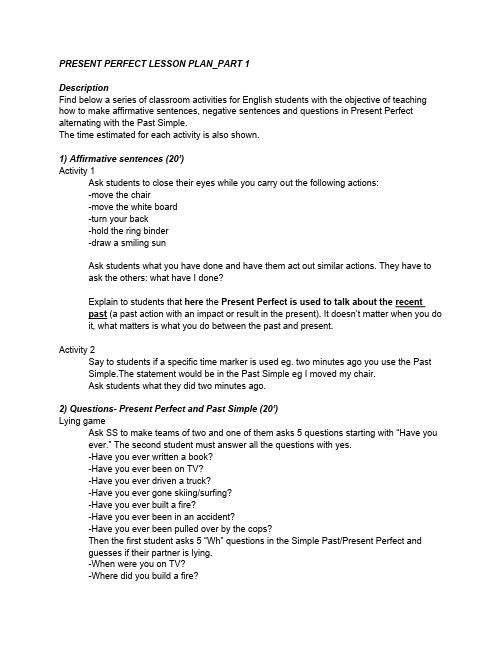
PRESENT PERFECT LESSON PLAN_PART 1DescriptionFind below a series of classroom activities for English students with the objective of teaching how to make affirmative sentences, negative sentences and questions in Present Perfect alternating with the Past Simple.The time estimated for each activity is also shown.1) Affirmative sentences (20’)Activity 1Ask students to close their eyes while you carry out the following actions:-move the chair-move the white board-turn your back-hold the ring binder-draw a smiling sunAsk students what you have done and have them act out similar actions. They have toask the others: what have I done?Explain to students that here the Present Perfect is used to talk about the recentpast (a past action with an impact or result in the present). It doesn’t matter when you do it, what matters is what you do between the past and present.Activity 2Say to students if a specific time marker is used eg. two minutes ago you use the PastSimple.The statement would be in the Past Simple eg I moved my chair.Ask students what they did two minutes ago.2) Questions- Present Perfect and Past Simple (20’)Lying gameAsk SS to make teams of two and one of them asks 5 questions starting with “Have you ever.” The second student must answer all the questions with yes.-Have you ever written a book?-Have you ever been on TV?-Have you ever driven a truck?-Have you ever gone skiing/surfing?-Have you ever built a fire?-Have you ever been in an accident?-Have you ever been pulled over by the cops?Then the first student asks 5 “Wh” questions in the Simple Past/Present Perfect andguesses if their partner is lying.-When were you on TV?-Where did you build a fire?-Why did you write a book?-What book have you written?Explain to students that you usually use:- When / Where/ Why: Past Simple because you are referring to a specific moment inthe past- What/Which: Present PerfectThe Present Perfect is used in this case to talk about life experiences.3) Negations- Present Perfect and Past Simple (40’)Travel around Spain game (30’)Ask students to sit in pairs and ask each other the travel questions below and two more that they can think of.a) Have you travelled to....? (Yes I have/ No I haven’t)eg. Oviedo, Teruel, Granada, Barcelonab) Where else have you travelled to?Ask SS to mention a city/town/village which he/she visited and particularly enjoyed.c) How did you get there?-I travelled by car/ bus/high speed train (AVE)c) What places have you visited there?The cathedral, town hall, marketplace, museum, bullring, etc.d) What traditional food have you eaten?appetizers, sausage, blood sausage, tortilla (egg omelette with fried potatoes), hake(merluza), cod (bacalao), anchovy (boqueron), baby eels (anguilas), stuffed peppers,croquettes, sweetbread (molleja), prawn (langostinos), shrimp (gambas/camarones),seafood (mariscos).e) Why did you visit these places?local festival, visit relatives, parks, day-trip.Activity 2 (10’)Ask students to write about their travel experience using the Present Perfect and Past Simple. Then they have to share their account with the rest of the class.Eg. I haven’t been to Barcelona, but I travelled to Oviedo during the last public holiday. I have participated in the local festival, selling beer and tapas in a stand.4) HomeworkAsk them to write about:a) three things they have done todayb) three positive events that have happened to them this yearc) three significant decisions that they have taken this yearExplain to students that here this is the third usage of the Present Perfect, to talk about actions that take place in an unfinished time period.。
现在完成时导学案--人教版八年级下册

现在完成时导学案班级:__________ 姓名:______________【内容目标】1.现在完成时的用法(现在完成时的定义)。
2.现在完成时的基本结构。
3.现在完成的时间状语(即关键词/标志词)。
4.have/has been to 、have/has gone to、have/has been in 的用法区别。
5.与一般过去时的用法区分。
6.瞬间动词(即短暂性动词)转换成延续性动词后与时间段的关系特殊情况:和运用。
(for与since的用法区别;how long)。
【学习重点】正确理解现在完成时的定义和基本结构,易混短语的用法辨析等,能够综合运用,巩固提高。
【学习难点】能准确运用短暂性动词和延续性动词。
【学习方法】发挥主观能动性,充分利用对比分析法、归纳总结法、合作探究法、互助学习法和练习法进行复习。
一、【课前延伸】写出下列动词的过去式和过去分词1.want ________2.visit__________3.love__________4. play_______5.study___________6.stop__________7.speak_______8.write______小结:动词规则的过去式和过去分词变化规则一样:一般动词词尾直接加-ed;以e结尾动词只加-d;以辅音字母加y结尾的动词,把y变为i再加-ed;以重读闭音节结尾且末尾只有一个辅音字母的动词,双写辅音字母,再加-ed。
动词不规则的过去式和过去分词只能特别记!二、【课前热身】翻译句子:1.我已经刷牙了。
_____________________________( 现在的结果:牙齿干净了。
)2.她已经洗脸了。
_______________________________( 现在的结果:脸干净了。
)3.我们已经吃早餐了。
__________________________( 现在的结果:饱了。
)4.我已经在这里住了十年了。
九年级 现在完成时复习导学案

九年级现在完成时复习导学案目标:1.自主复习现在完成时态语法内容。
2、比较现在完成时与一般现在时的差异。
课内探究自主回忆、讨论其构成及句式特点:1. 用法:⑴__________________ ⑵_____________________构成:主语 + _____________+ ___________________ + 其他。
(过去分词:规则动词的过去分词构成与动词过去式相同; 不规则动词需要特殊记忆。
)小组内交流“如何判定现在完成时态”,组长负责总结、记录。
现在完成时的含义之一是过去完成的动作对现在仍有影响, 标志:* 以already, just和yet为标志 * 以ever和never为标志 * 以动作发生的次数为标志 * 以so far为标志(=by now)* 其它 these days in the last/past + 时间段 recently 现在完成时的含义之二过去已经开始的动作一直延续到现在, 甚至有可能继续延续下去,我们可以从动作“延续”的特性和“时间”点段的区分入手,进一步学习现在完成时。
*“终止”、“延续”要转换初中阶段常见的有:come-be, go out -be out, leave-be away (from), begin-be on, buy-have, borrow-keep , join-be a member / 介词短语, die-be dead, become-be, open(v.)-be open(adj.) 等。
* 时间“点”、“段”须分清(for+时间段) (since+过去某一时刻) 现在完成时和一般过去式的区别学生讨论,总结_____________________.巩固检测单项选择(分层练习)1. -Where have you _____, Kate? -I've ______ to the bank. A. gone, goneB. been, beenC. gone, beenD. been, gone 2. Her grandfather ______ for two years.A. diedB. has diedC. has been deadD. has been died 3 . It's six weeks ______ I met you last. A. when B. since C. before D. for4 . Tom and Jack have arrived at West Hill Farm already.A. have gotB. have gone toC. have been toD. have reached 课堂小结现在完成时是初中英语学习的重点和难点,初三同学学习现在完成时,应抓住关键。
现在完成时专项复习导学案

现在完成时态导学案2014-10-22 Li Jinxiu学习目标:1. 掌握现在完成时态的结构,用法和常见标志词2. 掌握现在完成时中的特殊句型have/has been to ,have/has gone to 与have/has beenin的区别3. 掌握现在完成时态中瞬间动词与延续性动词的用法及现在完成时与一般过去时的区别Step1.蓦然回首2.通过预习请你默写出现在完成时的含义_____________________________________________________________________ ______________________________________________________________________3.通过预习请你默写出常见的使用现在完成时的判断词_______________________________________________________________________ _______________________________________________________________________4.通过预习请你默写出现在完成时的三个固定句型曾经去过某地____________________去某地了____________________在某地待了… ____________________5.通过预习请你默写出下列词的延续性动词1). leave___________________ 2). come / go_____________________3). begin / start___________________ 4). buy______________________5). lend / borrow___________________ 6) die________________________7). join___________________________ 8). open_____________________9). close _________________ 10). get married _______________Step 2.合作探究I. 用have been to… / have gone to… / have been in…的适当形式填空。
- 1、下载文档前请自行甄别文档内容的完整性,平台不提供额外的编辑、内容补充、找答案等附加服务。
- 2、"仅部分预览"的文档,不可在线预览部分如存在完整性等问题,可反馈申请退款(可完整预览的文档不适用该条件!)。
- 3、如文档侵犯您的权益,请联系客服反馈,我们会尽快为您处理(人工客服工作时间:9:00-18:30)。
现在完成时导学案学习目标:1.现在完成时的用法与构成2.现在完成时的时间状语3.短暂性动词与时间段的关系4.have been 与have gone 比较5.与一般过去时的用法比较学习重点:1 2 3 4 5 学习难点:3 5达标测试(一)动词填空:1. A:_____ you ________(clean) the room? B:Yes, we ________(do) that already.A: When ______ you _____(do) it? B:We _______(do) it an hour ago.2. A:_____ he ______(see) this film yet? B: Yes.A: When _____ he _____(see) it? B: He _____ it last week.3. How many times _____you______(be) there?(二)选用 for和 since填空:1. We haven’t seen each other ______ a long time.2. His father has been in the Party _____ 10 years ago.3. The film has been on _____ 20 minutes.4. Mr Green has worked here ______ he came to China.5. His grandparents have been dead ______ several years.6. It’s five years _______ we met last time.(三)用Have been to, have gone to, have been in 填空1. Mike and his parents __________ the north for half a year.2. Mum is not at home now. she _________ the shop.3. ______ you ever _____ to Kunming ? Never.4. Where _____ you ______ these days?5. Has Jim arrived yet? Yes, he _______ here for several days.6. Where is Peter? I don’t know where he _______.7. Hi Jim! Where _____ you _____ ? Li Lei is looking for you.现在完成时练习题一.写出下列动词的过去式和过去分词.feel __________ ____________ leave__________ ____________tell__________ ____________ sell__________ ____________say__________ ____________ catch __________ ____________lay __________ ____________ bring__________ ____________buy__________ ____________ think __________ ____________二.单项选择.1、He_______ to Canada, so you can’t see him recently.A have been toB have gone toC has been toD has gone to2、I have been to America, so_____ he.A didB haveC hasD does3、London has ever hosted the modern Olympics Paris .A. So doesB. So hasC. Nor doesD. Neither has4、Her grandfather ______ for two years.A. diedB. has diedC. has been deadD. has been died5、Both his parents look sad . Maybe they _________what's happened to him .(呼和浩特)A. knew B. have known C. must know D.will know6、He has _______ been to Shanghai , has he ?A. already B.never C.ever D. still7、Have you met Mr Li ______?A. just B. ago C.before D. a moment ago8、The famous writer _____ one new book in the past two years .A. is writing B.was writing C.wrote D.has written9、—Our country ______ a lot so far .—Yes . I hope it will be even ______ .A. has changed ; well B. changed ; goodC. has changed ; better D. changed ; better10、Zhao Lan ______already ______in this school for two years . A. was ; studying B. will ; studyC. has ; studied D. are ; studying11、We ______ Xiao Li since she was a little girl .A. know B. had known C. have known D. Knew12、Harry Potter is a very nice film .I_______ it twice .A. will see B. have seen C. saw D.see13、—These farmers have been to the United States .—Really ? When _____ there ?A. will they go B. did they goC. do they go D. have they gone14、—______ you ___ your homework yet ?—Yes . I _____ it a moment ago .A. Did ; do ; finished B. Have ; done ; finishedC. Have ; done ; have finished D. will ; do ; finish15、His father ______ the Party since 1978 .A. joined B. has joined C. was in D. has been in16、—Do you know him well ?— Sure .We _________ friends since ten years ago .A. were B. have been C. have become D. have made 17、—How long have you ____ here ?—About two months .A. been B. gone C. come D. arrived18、Hurry up! The play __________ for ten minutes .A. has begun B. had begunC. has been on D. began19、Miss Green isn't in the office . she_______ to the library . A.has gone B. went C.will go D. has been20、My parents ______ Shandong for ten years .A. have been in B. have been toC. have gone to D. have been历年中考重现:1.I_______ a letter from him since he left.(天津市)A.didn't receive B.haven't got C.didn't have D.haven't heard 2.How long have you _______ this book?(哈尔滨市)A.bought B.borrowed C.had D.lent3.—Where's Peter?—He _______ to Nanjing.(沈阳市)A.is going B.has been C.has gone D.went4.You've never seen such a wonderful film before,_______ ?(河北省)A.haven't you B.have you C.do you D.don't you5.We have lived here _______ five years ago.(河南省)A.when B.since C.before D.after6.—How do you like Beijing,Mr Black?—Oh,I _______ such a beautiful city.(江西省)A.don't visit B.didn't visit C.haven't visited D.hadn't visited7.The old people _______ lonely at all since we began to visit them once a week.(广州市)A.don't feel B.hasn't felt C.haven't felt D.didn't feel8.My grandfather_______ in the small town all his life.He always says he likes the town.(四川省)A.lived B.have lived C.has lived D.is living9.Miss Brown _______ to the Great Wall twice.(贵阳市)A.have been B.has been C.have gone D.has gone10.His brother has been to Stone Forest twice _______ he came to Yunnan.(昆明市)A.after B.before C.since D.for11.—Have you ever_______ to Haikou?—Yes,I_______ there with my family last August.(海南省)A.gone;went B.been;went C.been;went to D.been;was in12.His sister _______ her hometown for three years.She'll return next year.(合肥市)A.left B.has left C.has been away D.has been away from。
